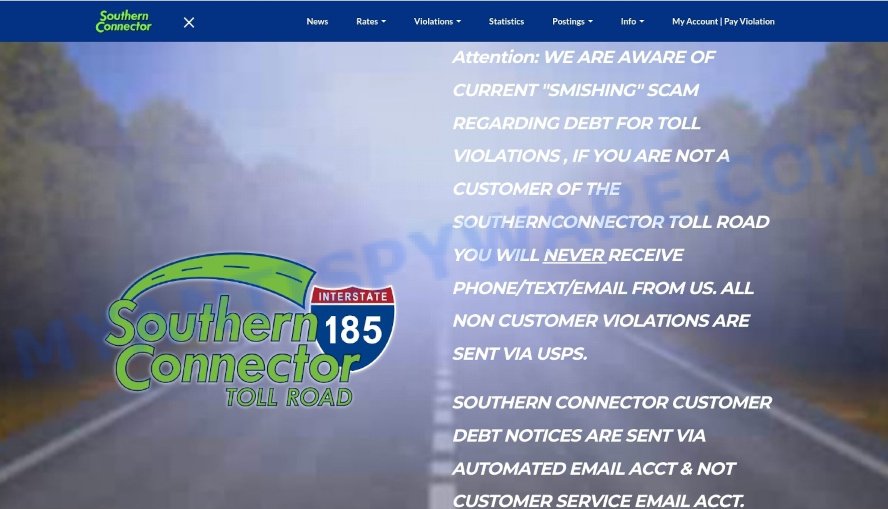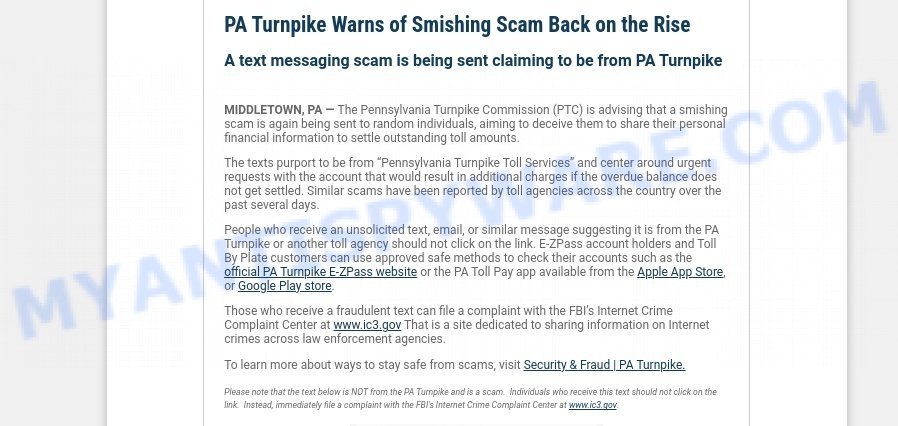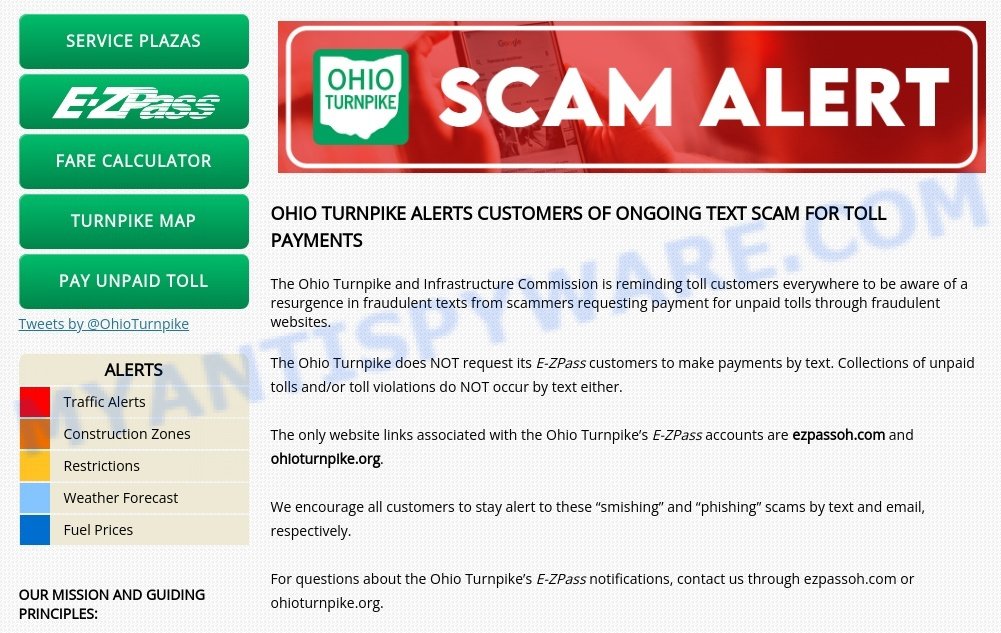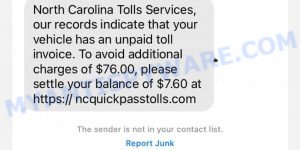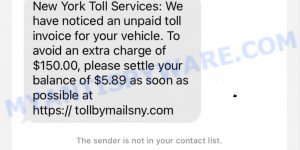Have you received a text message from ‘South Carolina Express Lane Payment Reminder‘ saying your recent trip on The Express Lane has been processed and to avoid a late fee of $48.90, you need to settle $4.89 at https://southernconnectortolls.com?
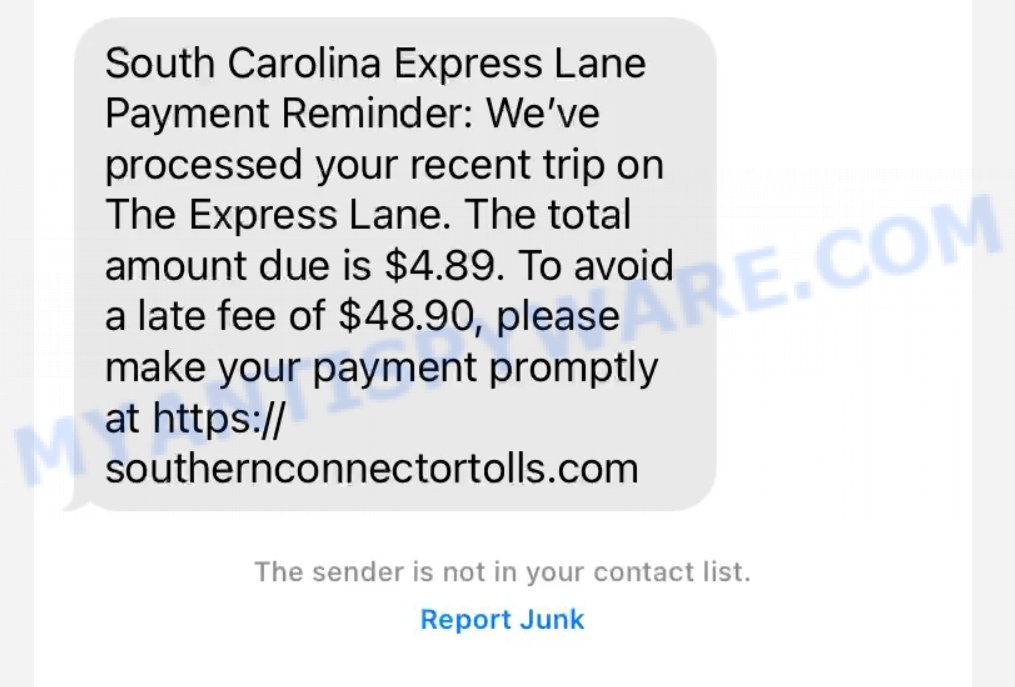
Question: Is this text message genuine and should you pay the amount requested?
Investigation Findings: This message is a scam. It typically says something like:
South Carolina Express Lane Payment Reminder: We’ve processed your recent trip on The Express Lane. The total amount due is $4.89. To avoid a late fee of $48.90, please make your payment promptly at https://southernconnectortolls.com
This link has been identified as UNSAFE by security platforms such as Google SafeBrowsing. The messages use a format similar to legitimate alerts but include a harmful link. The scam varies slightly between messages, altering only the state name or the domain URL, suggesting the use of a template for widespread fraudulent activities.

Answer: The text messages claiming to be from the South Carolina Express Lane Payment Reminder for a recent trip are fraudulent. Official toll agencies do not use text messaging to request payments or communicate about sensitive account information. If you believe you owe a toll, contact the toll agency directly using official contact methods available on their website. Do not click on links in unexpected texts or emails.
Table of Contents
🚨 Is the South Carolina Express Lane Payment Reminder Text Message a Scam?
Yes, the text message claiming you have a pending charge from your recent trip on the Express Lane and urging you to pay $4.89 at a suspicious website (southernconnectortolls.com) to avoid a $48.90 late fee is a SCAM! 🚫 If you’ve received such a text, exercise extreme caution. The claims are fabricated and designed to instill urgency, misleading you into submitting personal and payment information on a phishing site.
Background on the South Carolina Express Lane Payment Reminder Scam:
This scam, often referred to as “smishing” (a blend of SMS and phishing), involves fraudsters impersonating legitimate tolling agencies. The scammers send text messages that claim payment is due for recent use of express lanes, which they insist can only be resolved through the links provided in the message.
However, legitimate toll agencies clearly state that they never request toll payments or handle toll violations via text messages. Official communications about toll payments should direct users to their respective official websites and not through any unsolicited links sent via SMS.
The alarming spread of these scams has prompted various government and consumer protection agencies, including the FBI and the Better Business Bureau, to issue warnings. These agencies have reported that the scams have been reported in numerous states, with similar tactics used to exploit residents not just in South Carolina but also in other states across the country.
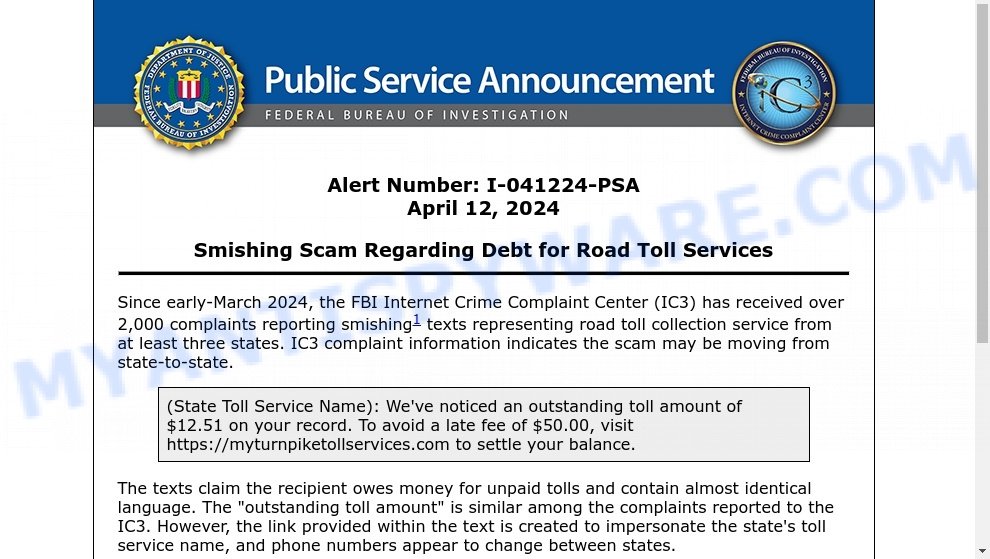
The fraudulent messages often claim an “unpaid toll invoice” or “outstanding toll amount” is due and direct victims to a malicious website that mimics the look and feel of a state toll service’s official site but is intended to harvest personal and financial information.
🚩 Red Flags to Watch Out For:
To protect yourself, be aware of these warning signs of the scam: 🔍🛡️
- 📧 Unsolicited Requests: Unexpected texts that claim you owe money for tolls, especially from sources you do not recognize.
- 🔗 Suspicious Links: The scam includes links to sites that are designed to look like official toll payment sites but are fraudulent, such as the example given with southernconnectortolls.com.
- ⏳ Urgency and Imposed Deadlines: These messages impose a tight deadline to pressure you into acting hastily, using fear of hefty late fees to coerce you into paying immediately.
- 💳 Demands for Personal Information: Be skeptical of any request to enter sensitive information on websites linked from these texts, as legitimate agencies manage such issues through secure, official channels.
- 👤 Anonymity of the Sender: Scammers might use untraceable numbers or obscure sender IDs, making it difficult to verify the source.
- 🔄 No Evidence of Debt: Legitimate toll fees would normally be documented formally or provide a method for dispute and verification, not merely mentioned in a text.
🕵️♂️ How the South Carolina Express Lane Scam Works
The South Carolina Express Lane scam is a type of phishing, designed to steal your personal and financial information by convincing you that you owe toll payments. Understanding how this scam operates is essential for your safety. 💡🔐
🚨 Playing on Your Fears
This scam begins with a text message falsely claiming you owe a specific amount for toll usage. It plays on your concerns about debts and the fear of additional fees, leading you to follow their deceptive instructions without questioning their legitimacy.
🔗 Fake Claims of Toll Violations
The scam message includes a link to a fraudulent website that mimics a legitimate toll payment service. This site is designed to appear trustworthy, tricking you into submitting your information.
🎭 Made-up Charges and Pressure
When you visit the fake site, you are presented with a charge you supposedly owe, often a small amount to make the scam appear plausible. They pressure you to pay this amount quickly to avoid larger fees.
📥 Asking for Your Payment Information
The site requests your credit card information to “settle” the fabricated toll fee. This tactic is a direct way for scammers to gain access to your money and personal details.
🔄 False Sense of Urgency
The scammers create an artificial emergency, convincing you that you need to act swiftly to resolve a problem that doesn’t actually exist. They pretend to have authority, and suggest that paying them is necessary to avoid further issues.
🕳️ Threats and Tricks
The scam involves deceiving you into thinking you are resolving a legitimate issue by entering your payment details. They may also threaten additional penalties if you delay, using fear to manipulate you into acting quickly.
By recognizing these tactics, you can protect yourself from this and similar scams. Always verify any toll-related claims through official channels and never share personal or financial information on suspicious websites.
Steps to Take if You Receive a Toll Payment Scam Text
Receiving a scam text claiming you owe a toll payment can be alarming. However, there are straightforward actions you can take to safeguard yourself.

Action Guide Against Toll Payment Scam Texts:
Firstly, keep calm. The scam message wants to rush you into making a mistake by paying or providing personal information. Recognize it for what it is: a common fraud attempt.
Do not send any money. Paying the scammer won’t solve anything. It only puts you at risk of losing money and encourages the scammer to target you again.
Don’t reply. Interacting with the scammer in any way can reveal more about you and confirm that your phone number is active, inviting more fraudulent messages.
If the scam text mentions specific details, like a password or personal info, investigate its origin. Check if your data has been part of a leak by using sites like haveibeenpwned.com.
Next, update your passwords. Create strong, unique passwords for each of your accounts and activate two-factor authentication wherever possible for added security.
Check your device for safety. Run a scan with reliable security software to ensure your phone or computer hasn’t been compromised by malware.
Report the scam text. Inform authorities such as the FTC or your local cybercrime unit. Your report can help prevent future scams.
Lastly, inform your network. Sharing information about this scam with friends, family, and colleagues increases awareness, making it less likely for others to fall victim.
📌 How to Report South Carolina Express Lane Scam Texts
If you get the South Carolina Express Lane text message saying you owe toll fees, it’s a scam. Reporting it can help you stay safe and protect others. Here’s the simple way to report these scam texts:

🔍 Spot the Scam Text
Find the text message that seems like a scam.
👉 Use Your Phone to Report
Your phone lets you report a text as spam or scam. Press and hold the scam message to do this.
🚩 Pick the Report Option
Select the right option to report the message. This could be “Report Spam” or something similar.
📱 Tell Your Mobile Company
Send the scam text to 7726. This spells “SPAM”, and it lets your mobile company know about the scam.
🔗 Tell the Authorities
Some places let you report scam texts to the government or groups that protect consumers. Look online to find out where you can report in your area.
🛡️ What to Do Next
If you clicked on the link in the scam text, watch your accounts for any strange activity. Think about changing your passwords. You might also want to tell your bank or credit card company about the scam.
✔️ Finish Reporting
Make sure you follow all the steps your phone, mobile company, or local government asks you to complete the report.
Threat Summary
| Name | South Carolina Express Lane Text Scam, South Carolina Express Lane Payment Reminder Scam |
| Type | Phishing, smishing |
| Text Message Content | “South Carolina Express Lane Payment Reminder: We’ve processed your recent trip on The Express Lane. The total amount due is $4.89. To avoid a late fee of $48.90, please make your payment promptly at https:// [phishing website]” |
| Phishing site | southernconnectortolls.com |
| Fake Fee | Extra fees (implied) |
| Targeted Information | Full name, address, phone number, credit card details (number, CVV, expiration date) |
| Harm | Loss of money, identity theft risk |
| How It Spreads | Mass text messaging to random or targeted phone numbers |
| Scammer’s Methods | Creating urgency, pretending to be a legitimate toll payment service |
| Variations | Different amounts claimed, various phishing website URLs |
| Protection Tips | Don’t click on links in unsolicited texts; confirm any toll charges directly through official websites; use strong passwords; enable two-factor authentication for online accounts; educate yourself on phishing signs |
| What To Do If You Receive A Scam Text | Don’t use the link in the text; verify any claims through the official site; report the scam to your mobile carrier; monitor your financial statements regularly |
| Reporting Info | Report the text to your mobile carrier by forwarding it to 7726; inform local or national consumer protection agencies; share information about the scam to warn others |
😱 What to Do If You Clicked on South Carolina Express Lane Scam Link
If you accidentally interacted with a text from the South Carolina Express Lane scam, it’s crucial not to panic. Follow these steps to safeguard your personal and financial information effectively.

🔐 Immediate Password Change
Immediately change the passwords for any accounts that you fear may be compromised. This includes your financial accounts, email, and any other sensitive accounts, especially if you have used similar passwords.
👀 Monitor Financial and Credit Reports
Closely monitor your bank accounts and credit reports for any unusual activities. Scammers might use your personal information to commit identity theft or unauthorized transactions.
📞 Contact Your Financial Institutions
Get in touch with your bank and credit card companies. Inform them about the scam and any actions you may have taken after interacting with the message. They can offer specific advice to secure your accounts.
🔒 Enable Two-Factor Authentication
Activate two-factor authentication for your sensitive accounts. This adds an extra layer of security, safeguarding your accounts even if scammers have obtained some of your credentials.
🚫🔗 Inform Your Contacts
Warn your friends, family, and network about the scam. Advise them to be cautious of similar messages and not to trust unsolicited texts or links, especially those claiming to be from financial institutions.
📝 Document the Scam
Record evidence of the scam, such as screenshots of the message and any interactions you had. This documentation can be useful if you need to report the incident or for future reference in case of any disputes or investigations.
👮♀️ Report to Cybersecurity Authorities
Consider reporting the incident to local cybersecurity or law enforcement authorities. While online scams are common, reporting them can contribute to broader efforts to combat such malicious activities.
📘 Stay Informed and Educated
Regularly update yourself on the latest online scams. Staying informed helps you recognize and avoid falling victim to similar tactics in the future.
🎯 Conclusion
The South Carolina Express Lane text message is a scam. The scammers behind this attempt use pressure tactics, sending messages that falsely claim you owe toll fees. What is their goal? To deceive you into clicking on links that take you to phishing sites designed to steal your personal and financial information. Falling for this scam can result in the theft of your sensitive data, further scams targeting you, and potential financial losses.
It’s crucial to understand that legitimate notifications about toll fees or financial matters generally come directly from the actual service providers or your bank, not through unsolicited texts with dubious links. If you receive an unexpected message regarding toll fees or any financial issues, it’s essential to verify its authenticity by contacting the service provider directly or visiting their official website independently.
Avoid clicking on links in text messages, and inform your friends and family about these scams. Regularly updating your passwords and enabling additional security measures like two-factor authentication can significantly enhance your online security. 🛡️
